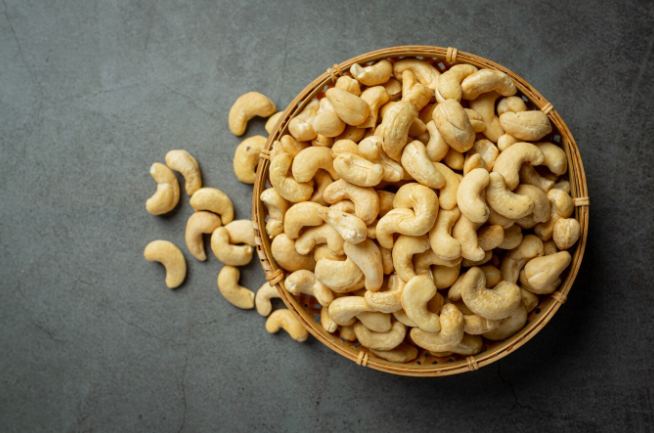Cashews are actually seeds known for their creamy texture and mildly sweet taste. When incorporated into a well-rounded diet, they can provide a good source of protein and essential minerals. Originally grown in Brazil, cashews were later introduced to regions like Africa and India by explorers. They offer a rich supply of nutrients, including copper,
Cashews are actually seeds known for their creamy texture and mildly sweet taste. When incorporated into a well-rounded diet, they can provide a good source of protein and essential minerals.
Originally grown in Brazil, cashews were later introduced to regions like Africa and India by explorers. They offer a rich supply of nutrients, including copper, magnesium, and phosphorus, which is a wholesome snacking option.
Cashews are also commonly used in plant-based dairy alternatives like cashew milk, vegan cheeses, and creamy cashew sauces.
Let’s explore the benefits of cashew nuts, their nutritional profile, and some drawbacks of consuming them.
Cashew Nutrition
Cashews are loaded with a variety of essential nutrients. A 1-ounce (28 grams) serving of raw, unsalted cashews typically contains:
Calories: 157
Protein: 5.16 g
Fat: 12.4 g
Carbs: 8.56 g
Fiber: 0.9 g
Copper: 0.6 milligrams (mg)
Magnesium: 82.8 mg
Manganese: 0.4 mg
Zinc: 1.6 mg
Iron: 1.8 mg
Phosphorus: 168 mg
Vitamin K: 9.6 µg
Vitamin B6: 0.1 mg
Selenium: 5.6 micrograms (µg)
Thiamin: 0.1 mg
Benefits of Cashew Nuts
Cashews are loaded with protein, heart-healthy fats, and antioxidants like polyphenols. Here are the top benefits of cashew nuts:
Reduce Cholesterol Levels
Cashews have often been misunderstood due to their saturated fat content. However, most of this fat comes from stearic acid, which is believed to have minimal impact on blood cholesterol. Studies show that including a small portion of cashews in your daily diet may help slightly lower LDL (bad) cholesterol levels.
Promotes Heart Health
Beyond managing cholesterol, cashews may also contribute to heart health because of their high magnesium content. Moderate magnesium intake is linked to a lower risk of ischemic heart disease. It’s a condition where restricted blood flow affects the heart’s function.
Boosts Fertility in Men and Women
Cashews are packed with zinc, a mineral known for enhancing reproductive health. Regularly eating cashews may improve sperm count and quality in men while supporting fertility in women. Including a handful of cashew nuts into your daily diet can be a simple, nutritious way to support reproductive wellness.
May Lower Stroke Risk
Cashews contain magnesium, which may help decrease the likelihood of strokes, especially hemorrhagic strokes. These occur when weakened blood vessels burst and leak blood into the brain. Maintaining adequate magnesium levels could support better vascular health and reduce stroke risk.
Supports Blood Sugar Control
Compared to many processed snacks, cashews have a lower carbohydrate content, which means they cause smaller spikes in blood sugar. This makes them a smart option for people managing type 2 diabetes or anyone aiming to reduce their risk of developing the condition.
May Help in Weight Management
Emerging research suggests that diets including nuts, like cashews, are often linked to greater weight loss and lower overall body weight when compared to diets without nuts.
A 2018 study found that the body may not absorb all the calories in cashews. Some of the fat stays locked inside the nut’s fibrous structure and passes through digestion without being used. However, roasting cashews might improve their digestibility, which could slightly increase calorie absorption.
Potential Drawbacks of Cashew Nuts
Cashews are typically safe for most people to enjoy as part of a balanced diet.
However, be mindful that flavored or roasted varieties may contain added oils and excess salt. For a healthier option, choose unsalted dry-roasted or raw cashews whenever possible.
Since cashews fall under the tree nut category, individuals with nuts allergies, such as almonds, walnuts, pistachios, or hazelnuts, may also be at higher risk of reacting to cashews. That said, some people may be allergic to cashews, specifically without having issues with other nuts.
If you notice any allergic reaction, seek immediate medical attention. Common warning signs include:
- Difficult in breathing
- Swelling in the mouth, tongue, or throat
- Skin rashes or hives
- Persistent coughing
- Dizziness
- Pale or bluish skin tone



















Leave a Comment
Your email address will not be published. Required fields are marked with *